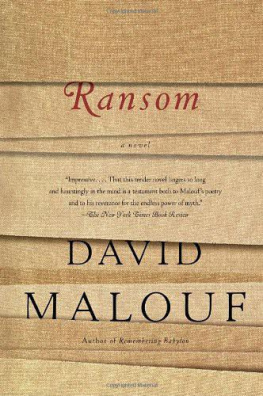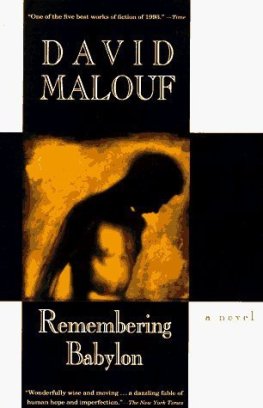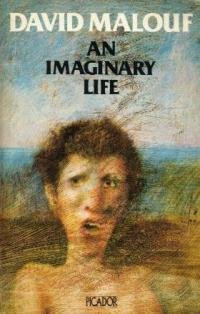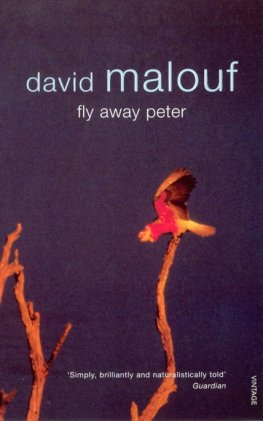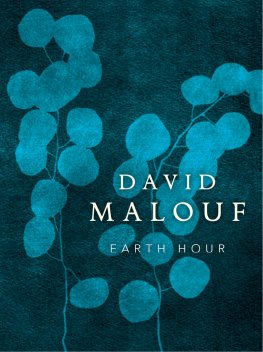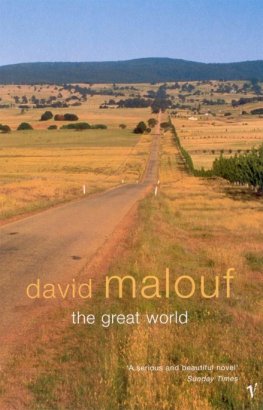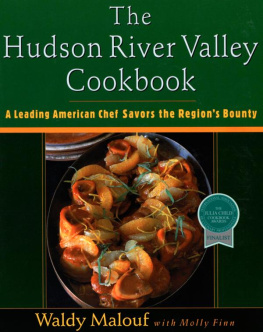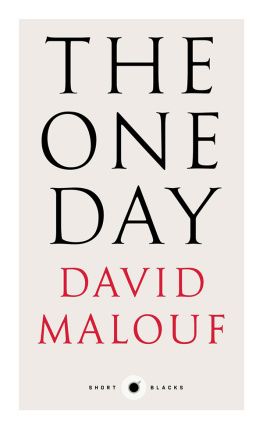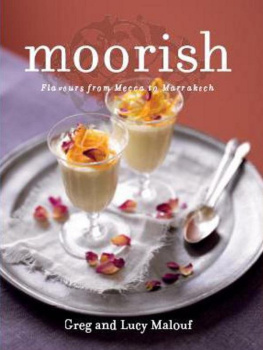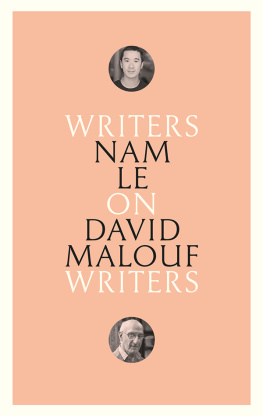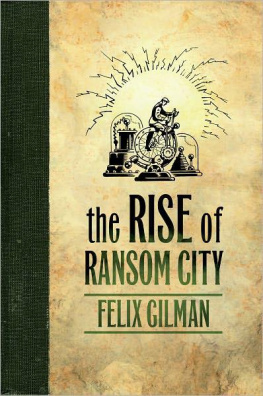David Malouf - Ransom
Here you can read online David Malouf - Ransom full text of the book (entire story) in english for free. Download pdf and epub, get meaning, cover and reviews about this ebook. year: 2011, publisher: Vintage, genre: Detective and thriller. Description of the work, (preface) as well as reviews are available. Best literature library LitArk.com created for fans of good reading and offers a wide selection of genres:
Romance novel
Science fiction
Adventure
Detective
Science
History
Home and family
Prose
Art
Politics
Computer
Non-fiction
Religion
Business
Children
Humor
Choose a favorite category and find really read worthwhile books. Enjoy immersion in the world of imagination, feel the emotions of the characters or learn something new for yourself, make an fascinating discovery.
- Book:Ransom
- Author:
- Publisher:Vintage
- Genre:
- Year:2011
- Rating:3 / 5
- Favourites:Add to favourites
- Your mark:
- 60
- 1
- 2
- 3
- 4
- 5
Ransom: summary, description and annotation
We offer to read an annotation, description, summary or preface (depends on what the author of the book "Ransom" wrote himself). If you haven't found the necessary information about the book — write in the comments, we will try to find it.
Ransom — read online for free the complete book (whole text) full work
Below is the text of the book, divided by pages. System saving the place of the last page read, allows you to conveniently read the book "Ransom" online for free, without having to search again every time where you left off. Put a bookmark, and you can go to the page where you finished reading at any time.
Font size:
Interval:
Bookmark:
Also by David Malouf
Fiction
The Complete Stories
Every Move You Make
Dream Stuff
The Conversations at Curlow Creek
Remembering Babylon
The Great World
Antipodes
Harlands Half Acre
Childs Play
Fly Away Peter
An Imaginary Life
Johnno
Autobiography
12 Edmondstone Street
Poetry
Selected Poems
Wild Lemons
First Things Last
The Year of Foxes and Other Poems
Neighbours in a Thicket
Bicycle and Other Poems
Typewriter Music
Libretti
Jane Eyre
Baa Baa Black Sheep
A note on sources
One rainy Friday afternoon in 1943, when we were unable to go out into the playground for our usual period of tunnel ball, our primary-school teacher, Miss Finlay, read us a story. It was the Troy story. For some reason, though I was a keen reader, I had never heard it, and when the bell rang and Miss Finlay dismissed us with the story left hanging, I was devastated.
We too were in the middle of a war. Brisbane, where I lived, was the headquarters of General MacArthurs Pacific campaign and the jumping-off place for hundreds of thousands of American and other troops on their way to the north. The city buildings were sandbagged, their windows crisscrossed with sticky-tape against the possibility of their shattering during a raid. I had immediately connected Miss Finlays ancient and fictional war with our own. We too were left hanging in the midst of an unfinished war. Who could know, in 1943, how our war too might end?
Thirty years later, in a poem called Episode from an Early War, still haunted by the characters in Miss Finlays story, I tried to bring the two parts of my experience together:
Sometimes, looking back, I find myself, a bookish
nine
year-old, still gazing down
through the wartime criss-cross shock
proof glass of my suburban primary school.
Blueflint gravel
ripples in my head, the schoolyard throbs. And
all the players
of rip-shirt rough-and-tumble
wargames stop, look on in stunned surprise:
Hector, hero of Troy,
raw-bloody-boned is dragged across the scene
and pissed on and defiled,
while myrmidons of black flies crust his wounds
and the angelic
blunt-faced ones, the lords of mutilation,
haul off and watch.
Thirty years later again, Ransom is a return to that unfinished story; to my discovery, once in 1943, once again in 1972, that
the war, our war,
was real: highways of ash
where ghostly millions rise out of their shoes and
go barefoot
nowhere
It re-enters the world of the Iliad to recount the story of Achilles, Patroclus and Hector, and, in a very different version from the original, Priams journey to the Greek camp. But its primary interest is in storytelling itself why stories are told and why we need to hear them, how stories get changed in the telling and much of what it has to tell are untold tales found only in the margins of earlier writers.
The story of how Patroclus came to be the friend and companion of Achilles occupies only half a dozen lines in the Iliad; the bare facts of how a small survivor of war, Podarces, came to be Priam (the ransomed one or the price paid), King of Troy, an equally brief passage, referring to the exploits of Hercules, in The Library, a history of mythology sometimes attributed, falsely it seems, to Apollodorus (born c. 180 BC ). How a simple carter, Somax, for one day became the Trojan herald Idaeus, and Priams companion on his journey to the Greek camp, appears for the first time in the pages of this book.
My thanks to Alison Samuel at Chatto & Windus in London, to Meredith Curnow and Julian Welch at Knopf, Sydney, and yet again to Chris Edwards, whose encouragement, and keen eye and ear, have been essential to Ransom from its earliest completed draft.
David Malouf is the author of, among other works, Dream Stuff, Remembering Babylon, An Imaginary Life, and The Conversations at Curlow Creek. Honors he has received include the IMPAC Dublin Literary Award, the Australia-Asia Literary Award, the Prix Femina tranger, and the Los Angeles Times Book Award. He lives in Australia.

The sea has many voices. The voice this man is listening for is the voice of his mother. He lifts his head, turns his face to the chill air that moves in across the gulf, and tastes its sharp salt on his lip. The sea surface bellies and glistens, a lustrous silver-blue a membrane stretched to a fine transparency where once, for nine changes of the moon, he had hung curled in a dream of pre-existence and was rocked and comforted. He hunkers down now on the shelving pebbles at its edge, bunches his cloak between his thighs. Chin down, shoulders hunched, attentive.
The gulf can be wild at times, its voices so loud in a mans head that it is like standing stilled in the midst of battle. But today in the dawn light it is pondlike. Small waves slither to his sandalled feet, then sluice away with a rattling sound as the smooth stones loosen and go rolling.
The man is a fighter, but when he is not fighting he is a farmer, earth is his element. One day, he knows, he will go back to it. All the grains that were miraculously called together at his birth to make just these hands, these feet, this corded forearm, will separate and go their own ways again. He is a child of earth. But for the whole of his life he has been drawn, in his other nature, to his mothers element. To what, in all its many forms, as ocean, pool, stream, is shifting and insubstantial. To what accepts, in a moment of stillness, the reflection of a face, a tree in leaf, but holds nothing, and itself cannot be held.
As a child he had his own names for the sea. He would repeat them over and over under his breath as a way of calling to her till the syllables shone and became her presence. In the brimming moonlight of his sleeping chamber, at midday in his fathers garden, among oakwoods when summer gales bullied and the full swing of afternoon came crashing, he felt himself caught up and tenderly enfolded as her low voice whispered on his skin. Do you hear me, Achilles? It is me, I am still with you. For a time I can be with you when you call.
He was five then, six. She was his secret. He floated in the long soft swirlings of her hair.
But she had warned him from the beginning that she would not always be with him. She had given him up. That was the hard condition of his being and of all commerce between them. One day when he put his foot down on the earth he knew at once that something was different. A gift he had taken as natural to him, the play of a dual self that had allowed him, in a moment, to slip out of his hard boyish nature and become eel-like, fluid, weightless, without substance in his mothers arms, had been withdrawn. From now on she would be no more than a faint far-off echo to his senses, an underwater humming.
He had grieved. But silently, never permitting himself to betray to others what he felt.
Somewhere in the depths of sleep his spirit had made a crossing and not come back, or it had been snatched up and transformed. When he bent and chose a stone for his slingshot it had a new weight in his hand, and the sling had a different tension. He was his fathers son and mortal. He had entered the rough world of men, where a mans acts follow him wherever he goes in the form of story. A world of pain, loss, dependency, bursts of violence and elation; of fatality and fatal contradictions, breathless leaps into the unknown; at last of death a heros death out there in full sunlight under the gaze of gods and men, for which the hardened self, the hardened body, had daily to be exercised and prepared.
Font size:
Interval:
Bookmark:
Similar books «Ransom»
Look at similar books to Ransom. We have selected literature similar in name and meaning in the hope of providing readers with more options to find new, interesting, not yet read works.
Discussion, reviews of the book Ransom and just readers' own opinions. Leave your comments, write what you think about the work, its meaning or the main characters. Specify what exactly you liked and what you didn't like, and why you think so.

